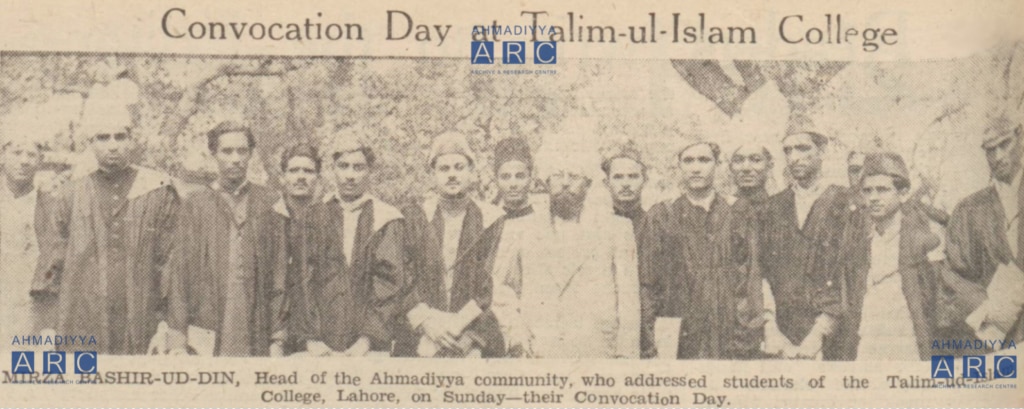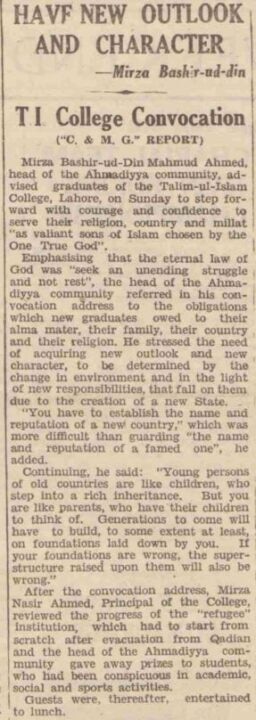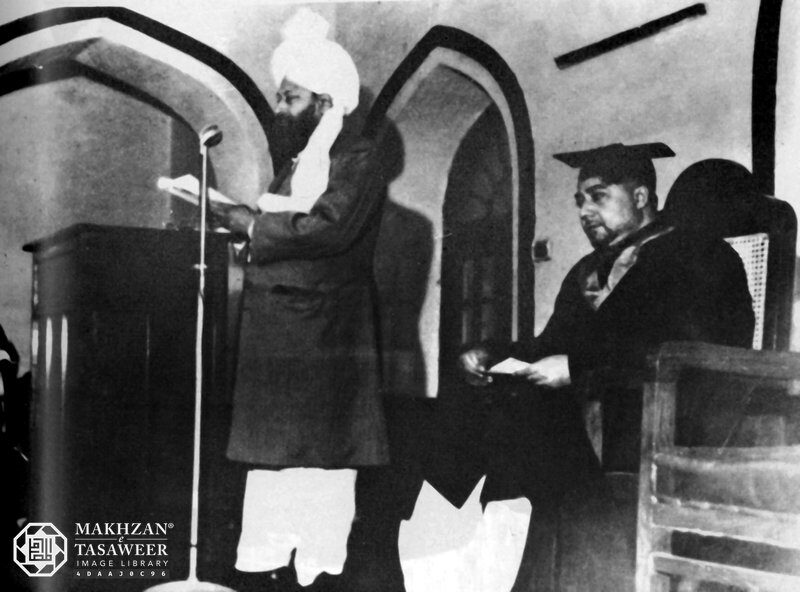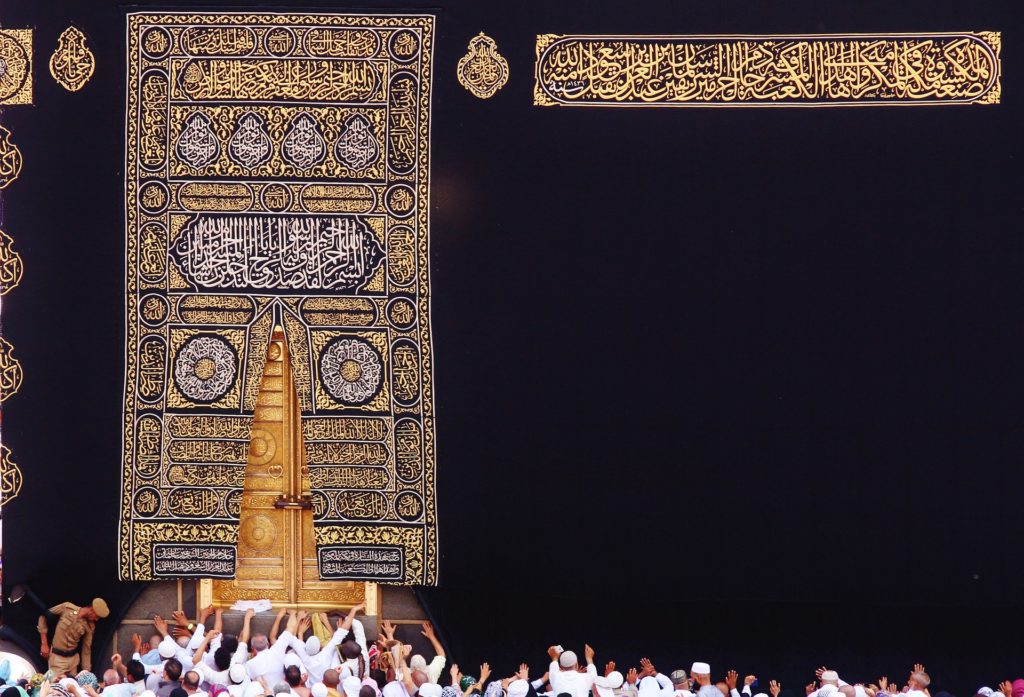Ata-ul-Haye Nasir, Ahmadiyya Archive & Research Centre

On 2 April 1950, Hazrat Musleh-e-Maud, Mirza Bashir-ud-Din Mahmud Ahmadra addressed the convocation ceremony of the Talim-ul-Islam College Lahore.
A day prior, The Civil and Military Gazette wrote under the heading “Tomorrow”:
“Convocation and Prize Distribution of Talim-ul-Islam College, Lahore, 11-30 am, College Hall. Hazrat Mirza Bashir-ud-Din Mahmood Ahmad, Head of the Ahmadiyya Community, will deliver the address.” (The Civil and Military Gazette, 1 April 1950, p. 2)
The same announcement was published in the 2 April issue as well.
The event was attended by various dignitaries, including the Mayor of Lahore Corporation, Mushtaq Ahmad, Deputy Commissioner Rehabilitation, Syed Jamil Hassan, Deputy Commissioner Lahore, SS Jafri, Zafarul Ahsan Lari Chairman of the Lahore Improvement Trust, Deputy Director Talimat-e-Aama Punjab, specialists in the education department, and editors of various periodicals.
The Civil and Military Gazette published a report about this address, and wrote:

“Have New Outlook And Character – Mirza Bashir-ud-din
“TI College Convocation
“(‘C. & M. G.’ Report)
“Mirza Bashir-ud-Din Mahmud Ahmed, head of the Ahmadiyya community, advised graduates of the Talim-ul-Islam College, Lahore, on Sunday to step forward with courage and confidence to serve their religion, country and millat ‘as valiant sons of Islam chosen by the One True God.’
“Emphasising that the eternal law of God was ‘seek an unending struggle and not rest,’ the head of the Ahmadiyya community referred in his convocation address to the obligations which new graduates owed to their alma mater, their family, their country and their religion. He stressed the need of acquiring new outlook and new character, to be determined by the change in environment and in the light of new responsibilities, that fall on them due to the creation of a new State.
“‘You have to establish the name and reputation of a new country,’ which was more difficult than guarding ‘the name and reputation of a famed one,’ he added.
“Continuing, he said: ‘Young persons of old countries are like children, who step into a rich inheritance. But you are like parents, who have their children to think of. Generations to come will have to build, to some extent at least, on foundations laid down by you. If your foundations are wrong, the superstructure raised upon them will also be wrong.’
“After the convocation address, Mirza Nasir Ahmed, Principal of the College, reviewed the progress of the ‘refugee’ institution, which had to start from scratch after evacuation from Qadian and the head of the Ahmadiyya community gave away prizes to students, who had been conspicuous in academic, social and sports activities.
“Guests were, thereafter, entertained to lunch.” (The Civil and Military Gazette, 3 April 1950, p. 3)
In its issue of 5 April 1950, the same newspaper published a group photo (seen in the beginning) of the TI College students with Hazrat Musleh-e-Maudra.

At the beginning of his address, Huzoorra said, “Human life goes through various changes, and these very changes become a source of making one’s life interesting. If these changes are removed from one’s life, it does not remain interesting anymore. […] Hence, in fact, life is the name of change. No progress is possible without revolutions. In fact, progress can be defined as leaping forward gradually, meaning by passing through various pious changes.” (Al Fazl, 3 April 1950, p. 2)
Huzoorra continued:
“God Almighty is an eternal truth. He is also called Immutable with respect to His being, however, in terms of attributes, He possesses infinite states as well. Allah the Almighty states in the Holy Quran:
كُلَّ يَوۡمٍ هُوَ فِيۡ شَاۡنٍ فَبِاَيِّ اٰلَآءِ رَبِّكُمَا تُكَذِّبٰنِ
[“Every day He (reveals Himself) in a different state. Which, then, of the favours of your Lord will you twain deny?” (Surah ar-Rahman, Ch. 55: V. 30-31)]
Commenting on this, Huzoorra said:
“The attributes of God Almighty continue to manifest themselves upon mankind in different aspects. Hence, obviously, mankind would also need to be harmonious with the [Divine] attributes that are being manifested at the time. […] In short, the point that has been stated in the above-mentioned verses is that God Almighty manifests His attributes in a different state from time to time, and along with this change, mankind is also required to change themselves in accordance with the attributes of Allah the Almighty that are being manifested. In this way, mankind moves forward towards progress.
“If one ponders over world history, one finds that in different eras, mankind has advanced in a certain direction. […] Those minds that are able to mould their direction completely in accordance with the prevailing direction guided by the Divine attributes succeed in becoming the leaders of their time, possess certain capabilities, and thus make a name in history.
“The Holy Prophetsa has indicated this point through the prayers of istikharah. No doubt, one reaps the fruit of their effort, however, it is a fact that inappropriate endeavour goes in vain. […] It is possible for one to attain each and every knowledge and perform all kinds of duties, however, it is impossible for one to attain perfection in each and every field. It is only Allah the Almighty who is aware of one’s intellectual abilities, and it is He alone Who knows which of the beneficial sciences and useful works are appropriate for them, as per their own capabilities and the needs of their time, country, and nation. Therefore, [the Holy Prophetsa] stated that regardless of whatever good work one is performing, they must pray to Allah the Almighty before beginning, and for this, he has taught the following words:
اَللّٰهُمَّ إِنِّیْ أَسْتَخِيْرُكَ بِعِلْمِكَ، وَأَسْتَقْدِرُكَ بِقُدْرَتِكَ، وَأَسْأَلُكَ مِنْ فَضْلِكَ الْعَظِيمِ، فَإِنَّكَ تَقْدِرُ وَلَا أَقْدِرُ، وَتَعْلَمُ وَلَا أَعْلَمُ، وَأَنْتَ عَلَّامُ الْغُيُوبِ، اَللّٰهُمَّ إِنْ كُنْتَ تَعْلَمُ أَنَّ هَذَا الأَمْرَ خَيْرٌ لِیْ فِیْ دِينِیْ وَمَعَاشِیْ وَعَاقِبَةِ أَمْرِیْ ـ فَاقْدُرْهُ لِیْ۔ وَیَسّرہ لِیْ ثُمَّ بَارکْ لِیْ فِیْہ۔ اللّٰھُمَّ ان کُنْت تعلم ان ھٰذَا الْاَمْر شَرٌّ لِیْ فِیْ دِينِیْ وَمَعَاشِیْ وَعَاقِبَةِ أَمْرِیْ ـ فَاصْرِفْهُ عَنِّیْ وَاصْرِفْنِیْ عَنْهُ، وَاقْدُرْ لِیَ الْخَيْرَ حَيْثُ كَانَ۔ ثُمَّ رَضِّنِي بِهِ
[“O Allah, I seek good from Thee out of Thy knowledge and seek power from Thee out of Thy power, and I beg of Thee out of Thy boundless Grace, for Thou hast power and I have no power, and Thou hast knowledge and I have no knowledge, and Thy knowledge encompasses the unseen. O Allah! If it be within Thy knowledge that this task is for my good, both materially and spiritually, and in respect of my ultimate end, then make it possible for me and bless me therein, but if it be within Thy knowledge that it is harmful to me in my spiritual and material life and in respect of my ultimate end, then turn me away therefrom, and enable me to attain good wherever it may be and cause me to be blessed therewith.” (Sahih al-Bukhari, Kitab ad-Da‘waat, Hadith 6382)]
“In other words, ‘O my Lord, I seek from You the best decision in regards to the work which I intend to perform, the knowledge which I intend to attain, or the duty which I am going to take since You are aware of my hidden abilities, intentions, personal needs, and requirements of my family, nation, country, and the world as a whole. Moreover, I also beg You to grant me the ability and help to fulfil my responsibility, according to whatever your verdict is. Thirdly, Your immense grace may shower upon me in order to fulfil the responsibility in relation to the matter that is appropriate for me [in Your eyes], towards which You guide me and help in achieving that. And may I achieve a great outcome from my effort instead of an insignificant one. […] O God, if the task which I intend to carry out is good in Your sight, for myself, for my religious and worldly needs, and that I could obtain the best result of whatever efforts and hard work I will exert, then enable me to perform that task, grant me support to carry out this task in the best possible way, and make its outcome beneficial for me as much as possible. On the contrary, if Your knowledge suggests that this work is not suitable for me, my religion, or the world, or that a satisfactory result could not be achieved through my efforts and hard work, then You may put hurdles in this work, and instil reluctance towards this matter in my heart as well. And create the means for whatever else is beneficial for me, and bring my attention to it and inculcate the desire for that in my heart.’
“How perfect is this prayer, and how elegantly attention has been brought to the fact that every good work is not suitable for every era and individual! […] Thus, in order to obtain the best possible outcome, one is required to carry out those tasks that are beneficial for their respective nation and mankind in a certain era, and they also possess the capabilities to perform those duties in the best possible manner. […]
“As I have stated earlier, all the beauties of human life are linked with an unlimited series of changes. Moreover, with the creation of mankind, Allah the Almighty has also provided the means for a limitless series of changes. However, a certain change [in one’s life] could only be a source of progress once it is based on correct principles; on the contrary, if it is based on incorrect principles, it might cause regression. Moreover, remaining at rest, in itself, holds hidden means of regress. A nation that ceases to leap forward, continues to regress.
“Therefore, our youngsters are required to always keep in mind this point that in this world, ceasing to leap forward is synonymous with death. The one who will stay at rest, will face failure or be pushed behind, which is synonymous with death. Thus, upon finishing their education, they are required to never assume that now it is time for them to rest, but rather, they must realise that it is time to act, instead of rest.

“As I have already said, from the perspective of Islamic principle, it is imperative for one to always leap forward, and their progress is linked to the fact that not only do they need to leap forward but to do so in the direction towards which God Almighty’s attributes are guiding. The method for this is that whatever they do, it should be done after prayer [dua] and after seeking help from God Almighty.
“I wish to particularly call the attention of the students who have finished their university education and obtained degrees, that when they had begun their studies, they might not have known that the Holy Prophetsa has taught to perform istikharah for every significant work. It is possible that they might have shown negligence towards prayers [du‘a] while choosing subjects for their study. But now that their first phase has been completed, the second one is before them, which might become the prelude for many other achievements. Hence, they are required to choose for themselves a pathway by seeking prayers from God Almighty in accordance with the method taught by Islam. […]
“Islam is a living religion, which has its role in every field of life and expects one to perform acts as per its commandments. If we claim to believe in Islam, it is essential for us to accept that we should follow [the commandments of] God and His Messengersa in every sphere of our lives. Moreover, we will also need to accept that the Will of Allah the Almighty has a great role in the progress and regress of the world. […] If we believe in God, we must believe in a living God, and if we believe in a living God, then we ought to believe that the works of our daily routine have a connection with Him, and our progress or regress is dependent upon His Powers and Blessings. […]
“Therefore, I advise those youngsters who are going to pursue their respective fields after finishing their education, that the law of God Almighty requires them to never rest at ease, but rather, they should prepare for a never-ending strive and try to leap forward at all times in accordance with the Quranic teaching. You are also required to always seek prayers from Allah the Almighty that He may enable you to perform good deeds at their appropriate times and to utilise the correct methods, and then He may grant you the best and most extraordinary results of those efforts.
“Remember, you are not only dutiful to your own being, but rather, you are also dutiful towards the institution that educated you, the family that spent money on your education – whether directly or indirectly – the country that made arrangements for your education, and then your religion as well.
“The duty that you have towards your educational institute requires that you utilise your knowledge in the best manner. University education is not the ultimate purpose; rather, it is the first step towards setting the ultimate goal. The degrees that are given to you by the university, hold no value in themselves; rather, it is you who give value to those degrees through your future practice. […]
“Therefore, you need to continuously strive to […] enhance your knowledge and to never consider the college education as the reward of your life, but rather, you should deem it as the seed for the nourishment of your knowledge, and to strive to make this seed fruitful to its capacity by utilising all means. So that, as a result of this endeavour, the value of those degrees may increase that you have gained today, and may the honour of this university also increase that has granted you these degrees. Moreover, may your nation be able to feel proud of you, and may your country be able to hope for the best possible result and witness their fulfilment as well.
“You are the citizen of a new country, citizens of an apparently small country among various big countries of the world, your country is not a wealthy one, rather, a poor one. You had been living under the protection of a foreign rule in peace and ease. Thus, you are required to mould your morals and characters, and you will have to establish the honour and reputation of your country in the world. […] Though it is a very difficult task to retain the honour of countries, the even greater task is to establish their honour. And this very heavy duty has been put on your shoulders. You are a new generation of a new country, thus, your responsibilities are far greater than the responsibilities of new generations of already-existing countries. […]
“You will have to keep in mind the coming generations while fulfilling responsibilities. The coming generations would be compelled – to an extent – to build on the foundations that you would establish today. If your foundation is faulty, the building that will be erected on it will also be faulty. […] Thus, since you are the first brick of Pakistan, you are bound to keep in mind that there remains no flaw in your methods and practice. Otherwise, the foundation of Pakistan will continue to be faulty forever.
“No doubt, it is a difficult duty, however, at the same time, it holds greatness as well. If you build Pakistan on firm foundations through your sacrifices, your name will be remembered with such honour and love that its example could not be found in the coming generations. Hence, I advise you to approach your new objective with determination, perseverance, and courage and to continue to do so. […]
“Therefore, O youngsters, who have been chosen by the One God! O brave soldiers of Islam! Centre of the country’s hopes! Worthy sons of the nation! Step forward, since your God, your religion, your country, and your nation are looking at your future with both sentiments of love and hope.” (Al Fazl, 3 April 1950, pp. 2-4)


Truly amazing MashaAllah